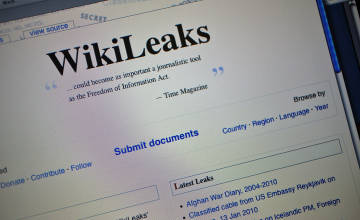Iran on Tuesday cast doubt on the authenticity of documents released by WikiLeaks and told its Arab neighbours not to fall into the whistleblower’s "trap."
Iran on Tuesday cast doubt on the authenticity of documents released by WikiLeaks and told its Arab neighbours not to fall into the whistleblower's "trap."
"This is a very suspicious plot. They have planted some Western and US crimes in them to present them as credible," foreign ministry spokesman Ramin Mehmanparast told a press conference when asked about the US document leak. But "the enemies of the Islamic world are pursuing a project of Iranophobia and disunity. This project only protects the interests of the Zionist regime and its supporters," he said.
"So the countries in the region must be aware not to fall into this trap and show in practice that these plots will never have any results and convince public opinion in practice by cooperation and unity," he said.
Iranian President Mahmoud Ahmadinejad on Monday dismissed the WikiLeaks documents as "worthless" and "mischief" which he insisted would not affect Tehran's relations with its Arab neighbours.
But US Secretary of State Hillary Clinton said they underline the broader world's concern about Iran's nuclear program. "Any of the comments that are being reported on allegedly from the cables confirm the fact that Iran poses a very serious threat in the eyes of many of her neighbours and a serious concern far beyond her region," Clinton said.
Mehmanparast hit back, saying Clinton's comments cast doubt on the validity of the leaked cables. "The fact that of all these documents Ms Clinton focuses on the ones involving Arab countries' concern about Iran's nuclear activities makes us suspicious about their authenticity," he said.
The spokesman also repeated charges made by other Iranian officials that "publishing these documents would not have been possible without the cooperation of Western intelligence services, especially those of the US."
Venezuela's President Hugo Chavez Monday called on Clinton to resign after the leak of embarassingly candid US diplomatic correspondence by WikiLeaks. "The empire stands naked... Mrs Clinton should resign," Chavez said in a speech. "It's the least you can do: resign, along with those other delinquents working in the State Department." "Somebody should study Mrs Clinton's mental stability," said Chavez. "I believe somebody should resign. I don't mean it should be (US) President (Barack) Obama, but the whole structure over there should fall apart, if only through embarrassment," he added. The United States "attacks... disrespects" other governments, including its allies and keeps tabs on other presidents, Chavez said.
US federal authorities have begun to investigate whether WikiLeaks founder Julian Assange could be charged under the Espionage Act for releasing secret diplomatic documents, media sources reported on Tuesday.
The Australian citizen, has been hiding in London to evade questioning over allegations that he assaulted two women in Sweden.
The Penatagon and the Justice Department are in the midst of an "active, ongoing criminal investigation," The Washington Post quoted U.S. attorney General Eric H. Holder Jr. as saying. Holder did not indicate to The Post whether Assange would indeed be charged for violations of the Espionage Act, nor whether such an indictment was imminent.
Former CIA general council Jeffrey H. Smith told The Washington Post, however: "I'm confident that the Justice Department is figuring out how to prosecute him."
